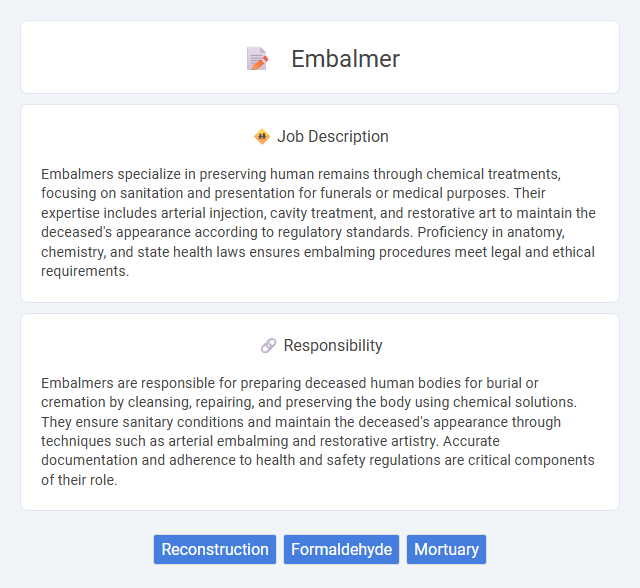
Embalmers specialize in preserving human remains through chemical treatments, focusing on sanitation and presentation for funerals or medical purposes. Their expertise includes arterial injection, cavity treatment, and restorative art to maintain the deceased's appearance according to regulatory standards. Proficiency in anatomy, chemistry, and state health laws ensures embalming procedures meet legal and ethical requirements.
Individuals with a strong emotional resilience and an ability to handle distressing situations may be suitable for an embalmer role, as the job involves working closely with deceased bodies under varying conditions. Those who are uncomfortable with exposure to death or biological materials might find this occupation challenging and potentially unsuitable. A steady hand, attention to detail, and respect for the deceased are likely important traits influencing job compatibility.
Qualification
Embalmers must possess specialized training in mortuary science, often requiring an associate degree and state licensure. Proficiency in anatomy, chemistry, and sanitation practices is essential for proper preservation of human remains. Strong attention to detail and knowledge of legal regulations ensure compliance and respectful handling throughout the embalming process.
Responsibility
Embalmers are responsible for preparing deceased human bodies for burial or cremation by cleansing, repairing, and preserving the body using chemical solutions. They ensure sanitary conditions and maintain the deceased's appearance through techniques such as arterial embalming and restorative artistry. Accurate documentation and adherence to health and safety regulations are critical components of their role.
Benefit
An embalmer's job likely offers benefits such as stable employment due to the ongoing need for funeral services. The role may provide a unique combination of technical skills and emotional fulfillment from helping families through difficult times. Opportunities for professional growth and certification could also enhance job security and earning potential.
Challenge
The embalmer job likely involves intricate challenges related to preserving human remains while maintaining dignity and sanitation standards. Understanding chemical solutions and mastering techniques to prevent decomposition are expected to require precision and steady hands. There may also be emotional challenges in dealing sensitively with grieving families during difficult moments.
Career Advancement
Embalmers can advance their careers by gaining certifications from organizations such as the International Conference of Funeral Service Examining Boards (ICFSEB) and pursuing specialized training in restorative art or crematory operations. Career growth often includes roles such as funeral director, mortuary manager, or educator within mortuary science programs. Experience in embalming techniques combined with strong communication skills enhances prospects for leadership positions in funeral homes and funeral service companies.
Key Terms
Reconstruction
Embalmers specialize in the reconstruction of deceased bodies, restoring facial features and physical appearance to provide a natural, lifelike look for viewing. Using advanced techniques like tissue building, suturing, and cosmetology, they address trauma, decomposition, or surgical alterations. Expert knowledge of anatomy and chemistry ensures precise restoration to honor the deceased and offer comfort to grieving families.
Formaldehyde
Embalmers use formaldehyde as a primary chemical to preserve human remains, preventing decomposition and maintaining tissue integrity for funerary services. This preservative penetrates tissues, effectively sanitizing and delaying bacterial growth while providing a lifelike appearance. Proper handling and ventilation are crucial due to formaldehyde's toxic and carcinogenic properties, ensuring safety in embalming practices.
Mortuary
Mortuary embalmers specialize in the preservation and sanitation of human remains, using chemical solutions to delay decomposition for funeral viewings and ceremonies. Their expertise includes preparing bodies for burial or cremation by disinfecting, restoring natural appearance, and dressing the deceased according to cultural and legal standards. Mastery of embalming techniques and adherence to health regulations are critical for maintaining public safety and providing respectful care in mortuary services.
 kuljobs.com
kuljobs.com